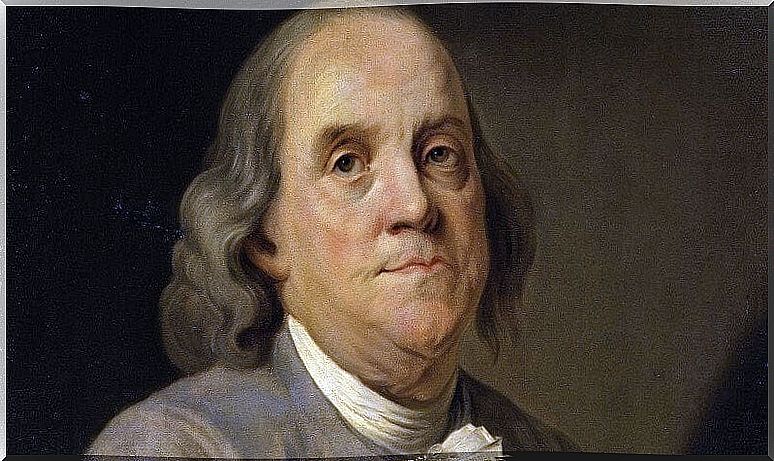5 Sentences By Benjamin Franklin Filled With Wisdom

Some of Benjamin Franklin’s phrases are veritable pills of wisdom that we want to reflect on today. We are talking about one of the founding fathers of the United States, a feat he achieved despite having only studied until he was 10 years old.
His insatiable thirst for knowledge and curiosity fueled his self-taught passion and allowed him to become, for example, the inventor of the heater in 1744 and the lightning rod in 1753. Great inventions that made him a recognized character.
However, we cannot forget other facets of Franklin, such as his work as a politician, author, writer, diplomat, statesman, activist… Definitely, Franklin was a very restless person and with great abilities to act in different professional areas. Today we share your wisdom in 5 of your best sentences.
Benjamin Franklin’s Best Phrases
1. The prevention of bad habits
The first of Benjamin Franklin’s sentences allows us to approach a very important topic: bad habits. Every day, many people propose to quit smoking, not to drink another drop of alcohol, or not resort to a new type of drug. But, daily, many of these same people fall back into their addictions.
As Franklin’s phrase says, it is much simpler to prevent bad habits. When we don’t experience something, whether due to social pressure or curiosity, we are sure that we will not be dependent on this substance. Because breaking a habit that brings certain pleasant sensations can be a very complicated task and requires a lot of energy and resources.
A withdrawal syndrome can be so unbearable for our bodies and our willpower so weak that sometimes just an ultimatum from a doctor – “if you keep smoking/drinking/drugging you will die” – could do with that we quit our addiction. The key to not going to that extreme is prevention.

2. Speak ill of others
If we were to analyze what people say about others, we would certainly be surprised at how often criticisms, judgments and words filled with envy appear. Maybe it’s learned behavior. Maybe it’s our insecurities and fears that drive us to do this. This second of Benjamin Franklin’s sentences urges us to do the opposite.
Modifying the content, often automatic, of our speeches is not simple, but if we are aware that we are speaking ill of someone, this is already a great advantage. Only then will we be able to change, little by little, our way of speaking ill of others to start speaking well. Isn’t it true that we like it when others speak well of us? Well, let’s do the same.
3. Learn from mistakes
As a good inventor that he was, Franklin experienced the pressure that comes with someone who fails in an attempt. Mistakes can make us feel that we don’t have the capacity to do what we want, that what we are trying to build will not be good enough, or that the most rational decision would be to give up.
However, Franklin persevered in his ideas despite attempts that failed. That wasn’t important to him. I tried to improve at all costs, because mistakes are for learning. If we are determined to achieve something, persevering, learning from our mistakes and continuing to acquire knowledge is the smartest decision.
Let us not be afraid of making mistakes or stumbling. This means that we are learning and that next time we will do much better. Remember that the best inventors were wrong many times before they managed to make their great invention. Behind this there are many hours, a lot of perseverance, a lot of willpower, a lot of commitment…

4. The shame
Benjamin Franklin’s fourth sentence tells us about an essential theme: shame. A shame that paralyzes and terrifies us. Why when we are little we are not ashamed of anything? Because shame is an emotion we learn to feel at certain times.
On the other hand, we all have a past. Poor and rich. In it we were and now we are. In many cases, it is necessary to talk about where we were and how far we were able to go to understand the power we have over what happens to us. In this sense, far from being a source of shame, having managed to improve our situation must be a source of pride.
Furthermore, Franklin’s phrase must be understood in a context in which the “new rich” were despised by those who were “the rich in birth”. At the time, each person had a social class in which he was born, and should remain in it. Nowadays, the social panorama is a little different, although still uncertain, as certain people continue to look down on others for not having studied at good universities, for example.

5. If you have any doubts, stop!
At various times we have doubts. Doubts about whether or not we should do something, about the decisions we have to make… In some cases, doubts respond to an insecurity that it would be important to resolve. However, other times they are like a warning sign in front of a decision that we are going to make, but which we are not really sure of.
No important decision is without doubt. They are the ones that let us know that we have reached a point where reflection is important; a reflection to which it is often necessary to dedicate a good deal of resources. So we may have to stop. However, this necessary paralysis does not have to be eternal: we will not always be able to clarify all questions, nor will circumstances always wait.
What do you think of these sentences by Benjamin Franklin? Did they make you reflect on some aspect of your life? As we can see, we don’t talk about anything we don’t know, however, today we continue to act in such a way that for years phrases like Franklin’s have invited us to act to make changes.







